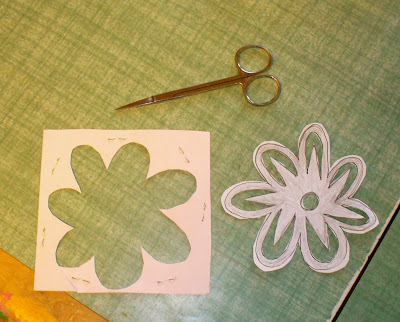 |
| Kitchen God I drew a few years ago. |
It's also known as the Kitchen God Festival because this is the day that the Kitchen God, Tsao-wang, and his wife, leave to report to heaven. In a Chinese home, Tsao-wang's picture hangs in a niche just above the stove. The picture is printed or drawn on rice paper.
Tsao-wang and his wife watch the daily life of the household and keep a written record of everything that goes on- whether the family is tidy or messy, honest or sneaky, thrifty or wasteful... it’s a little like having Santa watching all year, to see if you’ve been good or bad!

Agenda today:
1. Make window flowers
2. Make nian-gao (new year's cake)
3. Kitchen God Good-bye Ceremony
1. Make window flowers:

Today it's traditional to hang new papercut pictures all over the house. They are sometimes called huang hua, window flowers, because they are glued directly on to the windows. They hang also on the ceiling, walls, doors, mirrors, and lanterns.
Supplies: White scrap paper, pencil, colored origami paper, stapler, embroidery scissors, rice paper, glue sticks
 1. Draw a pattern on scrap paper: Start with the outline of a simple shape of a flower. Add inside shapes that will make it airy. Shade in the parts you will cut out, and remember that all the flower parts must be connected, or they will fall off when you cut.
1. Draw a pattern on scrap paper: Start with the outline of a simple shape of a flower. Add inside shapes that will make it airy. Shade in the parts you will cut out, and remember that all the flower parts must be connected, or they will fall off when you cut.
2. Gather and stack 2 to 4 pieces of origami paper together. Put the pattern on top, and staple around the outside edges.
3. Cut inside shapes first: Hold the papers on a pad of folded newspapers, and poke a hole with the point of the small scissors, then cut around the shape.
4. Next cut the outside shape and separate your finished flowers. Glue onto rice paper or directly to your window.
2. Make nian-gao (new year's cake):
Nian-gao is a special kind of cake that is always served at the New Year. The word gao sounds the same as a Chinese word that means higher up, so this is called the "cake filled with high hopes and expectations". Eating this cake will ensure you success in the New Year.
Ingredients:
- 3/8-c. packed dark brown sugar
- 1/2 c. water
- 1/8 c. vegetable oil
- 1 c. glutinous sweet rice flour
- 1/2 tsp. baking powder
- pinch of salt.
- sesame seeds
1- Heat together the sugar, water, and vegetable oil for a couple minutes, stirring constantly. It should be bubbly and clear. Cool slightly.
2- In a bowl, combine rice flour, baking powder, and salt. Add the cooled brown sugar mixture, and stir and knead to make a soft dough; it will be too sticky to pick up but should hold it's shape. Add more flour if it seems too loose.
3- Scoop a large spoonful of dough and drop into a bowl of sesame seeds. Roll to shape a ball, and coat completely. Place the cakes onto bamboo leaves (or parchment) in a bamboo steamer. Cover, and steam for 50-60 minutes. Serve warm.
Each Chinese New Year I put up a portrait of the Kitchen God and his wife, and they hang all year in my kitchen. I use it as a reminder to have integrity in my home life. Today I will send them off to heaven to make their report, and a special ceremony to honor the two is required.
My ceremony: |
| Kitchen God on his way to heaven. |
4. We then take down the picture, make a fire outside, and burn it. The gods fly skyward with the smoke.





No comments:
Post a Comment